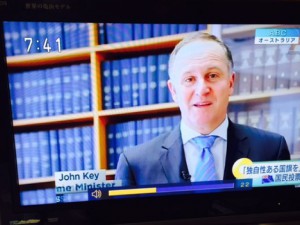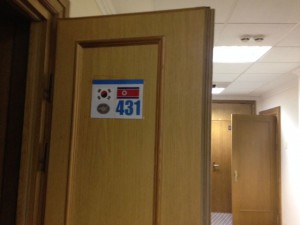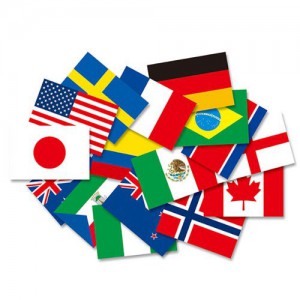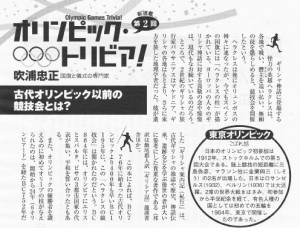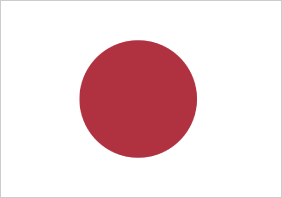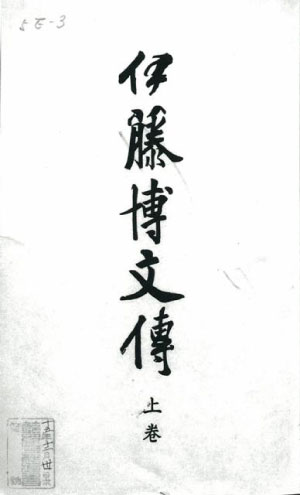
名前は自らの1つの署名から、「傳」は谷書いたものを合成して表紙にした
昨日(11月19日)、私はこの岩倉使節団研究の第一人者であり、『堂々たる日本人』(祥伝社)ほか関係の研究書を執筆しておられる泉三郎先生に、国際文化会館で1時間余、ご指導いただく機会を得ました。
泉先生によれば「伊藤の英語力は、長州藩士の時代にイギリスへ密航した経験はあるが、その時は身分も低く、短期間だったので、語学の習得というまでには至らなかったのではないか。ただ、明治3年に訪米したときには熱心に英語の習得にも努めたので、かなりのものだったと思われる」ということでした。また、「語学に堪能でこのときにも同行した福地源一郎とか芳川顕正(後に第二次伊藤内閣の内相兼司法相)、あるいはチヤールス・ウォルコット・ブルックス名誉領事あたりの力を借りたのかもしれない」。
伊藤は井上聞多・遠藤謹助・山尾庸三・野村弥吉らと共に「長州五傑」賭して1863(文久3)年はイギリスに密航しました。伊藤が持っていたのは前年発行された間違いだらけの『英和対訳袖珍辞書』1冊と寝巻だけであったとも伝えられています。
ロンドンでは、アレクサンダー・ウィリアムソン(University College London教授の化学者)の邸に滞在し、英語や礼儀作法の指導を受け、語学の習得と博物館や美術館、海軍施設、工場などを訪ねて見聞を広め、日英間の圧倒的な国力の差を知り、尊皇攘夷から尊王開国に転じたとされます。
ただ、早々に米英仏蘭4国の艦隊が長州を攻撃しそうだという情報を得ると、井上とともに急ぎ帰藩し、戦争回避に奔走下のですが、8月5日に下関戦争(馬関戦争)が勃発、長州の砲台は全て破壊される結果となりました。
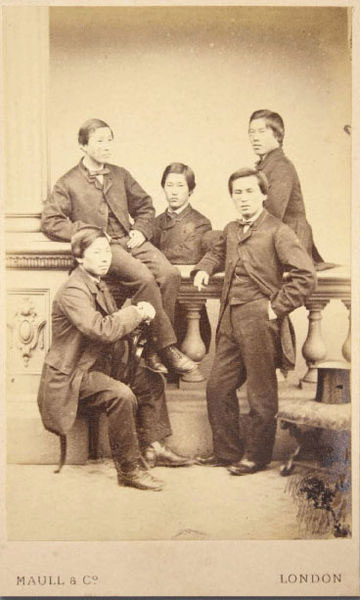
「長州の五傑」。前列左から井上聞多(初代外相など)、山尾庸三(工学分野で活躍、聾教育の先駆者)、後列は左から遠藤謹助(造幣局長。「桜の通り抜け」を企図)、野村弥吉(「鉄道の父」)、伊藤博文。
明治になって直後の1870(明治3年)11月から約半年、財政幣制調査のため、芳川顕正、福地源一郎らと渡米し、連邦銀行について学びました。このときには鋭意英語の習得にも務め、かなりの語学力を身に付けたとされています。また、帰国後は、わが国最初の貨幣法である新貨条例の制定を建議し、制定にこぎつけました。
私が泉先生にお尋ねしたのはほかに3点ありました。①ご著書の中に「サンフランシスコクロニクル」で演説が紹介されたとあるが、その日付はいつか、②伊藤の「日の丸演説」はこのときだけか、そして、③岩倉使節団の前年太政官布告第57号で制定された「日の丸」が、縦横比7:10で円の中心が対角線の100分の1だけ旗竿側に寄るという「奇妙な」デザインになっていることについてご意見がないか、と言う質問でした。
『堂々たる日本人』で紹介されている「サンフランシスコクロニクル」に「日の丸演説」が掲載された日付は確認するヒントを教えていただきましたので、さらに調べることにしました。また、「日の丸演説」はサンフランシスコでだけとのことでした。
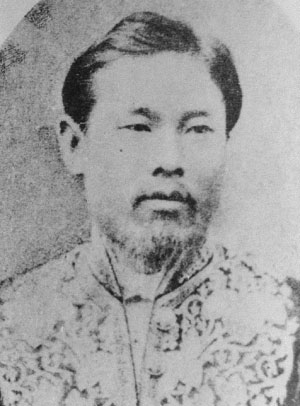
伊藤博文
太政官布告のデザインについては、初めてお知りになったということですが、私が当時のフランスの国旗であり、今のフランスの海上用国旗のデザインでもある三色の幅が30:33:37の影響、すなわち、フランスからのお雇い外国人の「入れ知恵」ではないかということを申し上げたところ、その可能性を肯定され、具体的に若干の固有名詞を挙げてくださいました。私としてはさらに研究して行きたいと思っています。
ただ、日本の公文書を蒐集・保管していた書庫は1874(明治7)年に焼失し、論証することはかなり難しいとは思いますが、諦めないで追究して行きたいと思っています。
『伊藤博文伝』(春畝公追頌会=金子堅太郎代表。春畝は「しゅんぽ」と読み、伊藤の号)から「桑港に於ける公の英語演説筆記」を転載します。この英文で、雰囲気だけでも少し味わってみてください。
泉先生に拠れば、ランマンという人物は、「ワシントンの日本公使館のスタッフで、名門の出身、日本を紹介する著作が30点ほどある人物」だそうです。
邦訳は次回、ご紹介します。
LEADERS OF THE MEIJI RESTORATION
IN AMERICA
by
Charles Lanman
(American Secretary of Japanese Legation in Washington) PP. 9, 10, 11.The Vice-Ambassador Ito, in furtherance of the response, read the following words in a clear voice, so as to be distinctly understood by all present:
“Gentlemen: Being honoured by your kind generosity, I gladly express to you, and through you to the citizens of San Francisco, our heartfelt gratitude for the friendly reception which has everywhere greeted the Embassy since its arrival in your State, and especially for marked compliment paid this evening to our nation.
This is perhaps a fitting opportunity to give a brief and reliable outline of many improvements being introduced into Japan. Few but native Japanese have any correct knowledge of our country’s internal condition.
Friendly intercourse with the Treaty Powers has been maintained (first among which was the United States), and a good understanding on the part of our people has increased commercial relations.
Our mission, under special instruction from His Majesty the Emperor, while seeking to protect the rights and interests of our respective nations, will seek to unite them more closely in the future, convinced that we shall appreciate each other more when we know each other better.
By reading, hearing, and by observation in foreign lands, our people have acquired a general knowledge of constitutions, habits, and manners, as they exist in most foreign countries.
Foreign customs are now generally understood throughout Japan.
To-day it is the earnest wish of both our Government and people to strive for the highest points of civilization enjoyed by more enlightened countries. Looking to this end, we have adopted their military, navel, scientific, and educational institutions, and knowledge has flowed to us freely in the wake of foreign commerce. Although our improvement has been rapid in material civilization, the mental improvement of our people has been far greater. Our wisest men, after careful observation, agree in this opinion.
While held in absolute obedience by despotic sovereigns through many thousand years, our people knew no freedom or liberty of thought. With our material improvements, they learned to understand their rightful privileges, which, for ages, have been denied them. Civil war was but a temporary result. Our Daimios magnanimously surrendered their principalities, and their voluntary action was accepted by the General Government.
Within a year a feudal system, firmly established many centuries ago, has been completely abolished, without firing a gun or shedding a drop of blood. These wonderful results have been accomplished by the united action of a Government and people, now pressing jointly forward in the peaceful paths of progress. What country in the middle ages broke down its feudal system without war?
These facts assure us that mental changes in Japan exceed even the material improvements. By educating our women, we hope to insure greater intelligence in future generations. With this end in view, our maidens have already commenced to come to you for their education. Japan cannot claim originality as yet, but it will aim to exercise practical wisdom by adopting the advantages, and avoiding the errors, taught her by the history of those enlightened nations whose experience is her teacher.
Scarcely a year ago, I examined minutely the financial system of the United States, and, while in Washington, received most valuable assistance from distinguished officers of your Treasury Department. Every detail learned was faithfully reported my Government, and suggestions then made have been adopted, and some of them are now already in practical operation. In the Department of Public Works, now under my administration, the progress has been satisfactory. Railroads are being built, both in the eastern and western portions of the Empire. Telegraph wires are stretching over many hundred miles of our territory, and nearly one thousand miles will be completed within a few months. Light-houses now line our coasts, and our ship-yards are active. All these assist our civilization, and we fully acknowledge our indebtedness to you and other foreign nations.
As Ambassadors and as men, our greatest hope is to return from this mission laden with results valuable to our beloved country and calculated to advance permanently her material and intellectual condition. While in duty bound to protect the rights and privileges of our people, we shall aim to increase our commerce, and, by a corresponding increase of our productions, hope to create a healthy basis for this greater activity.
As distinguished citizens of a great commercial nation, prepared for business, desirous of participating in the new commercial era now dawning auspiciously upon the Pacific, Japan offers you her hearty co-operation.
Your modern inventions and results of accumulated knowledge enable you to do more in days than our fathers accomplished in years. Time, so condensed with precious opportunities, we can ill afford to waste. Japan is anxious to press forward.
The red disk in the centre of our national flag shall no longer appear like a wafer over a sealed empire, but henceforth be in fact what it is designed to be, the noble emblem of the rising sun, moving onward and upward amid the enlightened nations of the world.
数世紀にわたって強固に続いてきた日本の封建制度は、一発の弾丸も放たず、一滴の血も流さずして、わずか一年以内に撤廃することができました。この驚くべき事実は。政府と人民との共同行為によって達成されたものであり、両者は今や一致団結して平和の道を進みつつあります。他のいずれの国が、戦争なくして中世の封建制度を打破することができたでありましょうか。今や外国の風習は、日本全国に広く行きわたりつつあります。今日、わが国の政府および人民の希望は、先進諸国の持つ文明の最高点に到達することです。この目的に向かって、わが国は陸海軍、学校教育の諸制度を整えています。また、外国貿易が発展するに従い、知識も自由にわが国に流入しています…。
アメリカにしてみてもこの1971年というのは、南北戦争(The Civil War 1861~65)が終わったばかりです。南北戦争でアメリカは、第二次大戦での戦死者の倍すなわち60万人あまりが亡くなっているのです。伊藤の「日の丸演説」を聴いたアメリカ人はこの、南北戦争の悲劇を想起し、流血の惨事を極限した形で維新を遂げつつある日本に、ある種の畏敬の念を覚え、賞賛したのではないでしょうか。南北戦争とは期間も死傷者の数もまるで違う戊辰戦争でした。ですから、いささか事実に反するとはいえ、「一発の弾丸も放たず、一滴の血も流さずして、わずか一年以内に撤廃することができ」たという内容をさわりとするこの演説で、新しい日本を建設しようという伊藤たちの意気込みが十分伝わったのではないでしょうか。
そして、最後に、場内に掲げられていた「日の丸」を指さしながら、伊藤は次のように述べたのです。
「The red disc in the centre of our national flag shall no longer appear like a wafer over a sealed empire, but henceforth be in fact what it is designed to be, the noble emblem of the rising sun, …」の部分です。
文中のwaferはウエハースのこと、すなわち、アイスクリームなどに添える薄くて軽い焼き菓子やカトリックのミサ(聖餐)用のパン、オブラート、そしてwafer capsuleと同じく封緘紙といった意味の単語です。
ここはむしろ日本語の原文を『伊藤博文伝』上巻で見ることにしましょう。
「我国旗の中央に点ぜる赤き丸型は、最早帝国を封ぜし封蝋の如く見ゆることなく、将来は事実上その本来の意匠たる、昇る朝日の尊き徽章となり、世界に於ける文明諸国の間に伍して前方に且つ上方に動かんとす」。
封蝋(sealing wax)とは当時、条約締結に当たっては署名の上に赤い朱肉のようなもの(封蝋)を置きその間をリボンで結ぶのが国際的な習慣でした。また、手紙の緘や高級酒の栓に付して、中身が手つかずであることを証明し、高級感を演出するために用いられることがあります。
もちろん、この演説で伊藤は、「日の丸」とはそんなものではない、誇りある日本の国旗だと言っているのです。
この演説は、わが国の政府首脳が初めて国旗について公に説明したものなのです。
『伊藤博文伝』の邦訳では今の若い人には理解しにくい面もあろうかと思い、現代語での訳文を次回に紹介したいと思います。

